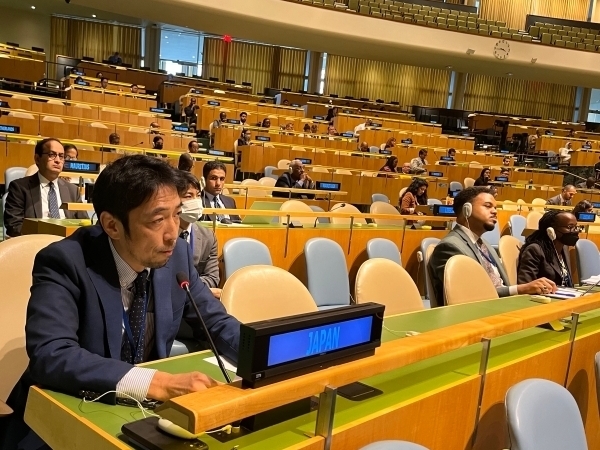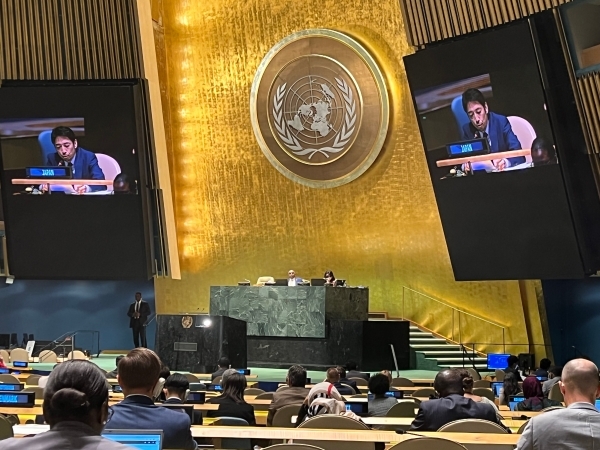平和構築の資金調達に関する国連総会決議採択における水田公使参事官ステートメント
令和4年9月8日
 |
 |
Mr. President.
Japan welcomes the adoption of the draft resolution L.86 by consensus. I thank Their Excellencies, the Permanent Representatives of Kenya and Sweden for tirelessly co-facilitating the informal consultations. Japan engaged in the process constructively and gladly joined the consensus to further advance the UN's peacebuilding and sustaining peace agenda.
With a view to facilitate our future discussions on this important theme, I would like to clarify Japan’s position on a few points that remained contentious during the negotiation process, particularly in relation to operative paragraphs 16 and 18.
First, the PBF's continued flexibility and agility must be ensured at all costs to respond to the needs on the ground. For this very reason, the UN’s programmatic activities, typically conducted by the Funds and Programmes for development and humanitarian activities, have been financed in principle by voluntary contributions. The level of transparency, accountability and oversight required for assessed contributions is not compatible with the flexibility and agility needed for these field operations.
Therefore, if we are to consider using the assessed contributions for the PBF, created to finance operations on the ground, its use should be strictly limited to exceptional cases and in a way that does not jeopardize the flexibility and agility of the PBF. Recurrent administrative costs such as staff costs could be considered as an exception. Time-bound programmatic activities to support smooth transition after the UN mission’s withdrawal could be another. In any case, the use of assessed contributions and that of voluntary contributions must be clearly demarcated. This is Japan’s understanding of the phrase "assessed funding is not meant to substitute voluntary contributions" in OP16.
Second, Japan would like to re-emphasize the need to revisit the question of the most desirable funding target for the PBF. The Fund's current resources may not be sufficient to finance all of the increasing project proposals by the relevant UN entities. However, this fact alone cannot support the argument that the PBF is under-funded. We expect the PBSO to conduct strict scrutiny and approve only quality and qualified projects to meet its core funding purpose, which is to provide “seed funding.” Even if we were to acknowledge funding shortages compared to qualified applications, the mechanism of voluntary contributions per se is not the cause of the shortage. It gives no justification for resorting to assessed contributions, which is not meant to substitute voluntary contributions.
Last but not least, I would like to posit the key elements for securing adequate, predictable and sustained financing for the PBF, or for peacebuilding and sustaining peace more broadly.
First, the monitoring and evaluation of PBF-funded projects and sharing of their results. We welcome the launch of the SG's peacebuilding dashboards, as noted in OP 9.
Second, creating synergy between the PBF and the PBC, as mentioned in OP 2. The PBC should become an instrument to enhance the transparency and visibility of the PBF.
Third, strengthening the UN system-wide coherence of all the relevant activities conducted by different entities, including PKOs and SPMs, Agencies, Funds and Programmes. The triple nexus should be strengthened on the ground and at the Headquarters level as well.
In conclusion, I would like to reaffirm Japan's full commitment to advancing the peacebuilding and sustaining peace agenda.
I thank you.
